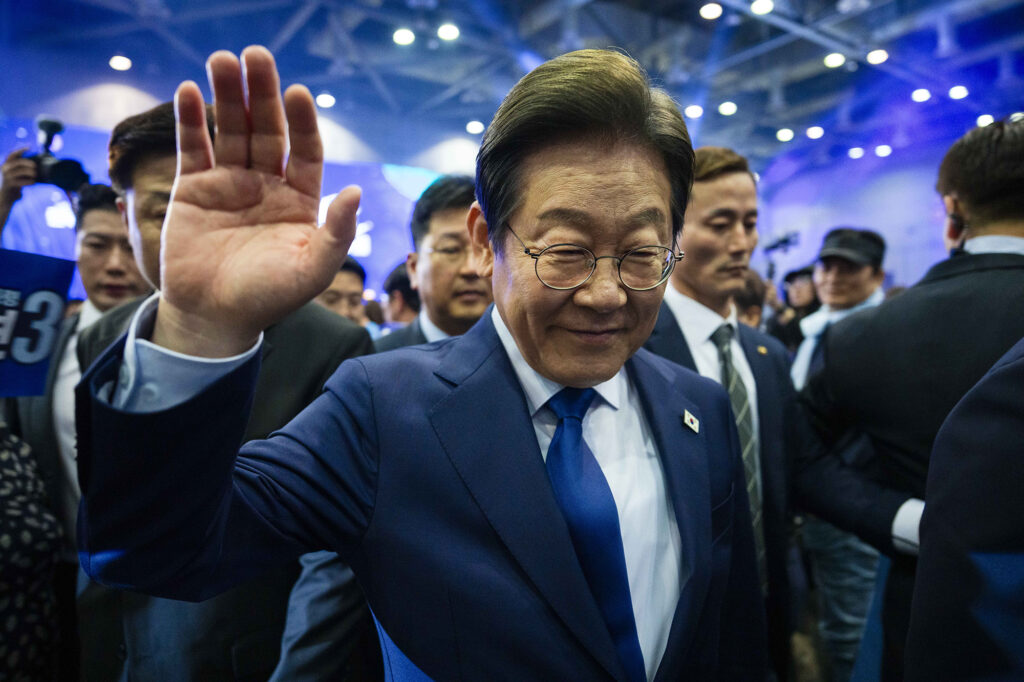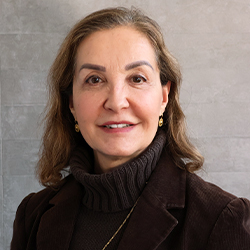Interviews / Asia-Pacific
12 June 2025
What Are the Prospects Following the Election of the Progressive Lee Jae-Muyng as Head of a Disillusioned South Korea?

If there is one term that has frequently been used in commentary on South Korea’s domestic situation following President Yoon Suk-yeol’s attempted coup on 3 December 2024, it is “chaotic”. According to many observers, the country has just experienced the most unstable six months in its history. It is therefore far from certain that the presidential election of 3 June will restore trust and political stability, particularly as the surrounding regional environment—including the evolving relationships with China, Russia and North Korea—remains highly volatile. In the face of a major political crisis, it is reassuring that South Korea’s institutions, from the National Assembly to the Constitutional Court, have proven solid, applying the Constitution with rigour. On the streets, millions of citizens demonstrated peacefully, expressing their commitment to democratic values. This movement, hailed as a victory for the young South Korean republic, also exposed the flaws in its political system, underlining the need for far-reaching reforms to ensure it functions without abrupt shocks or violent confrontations between its key institutions and state bodies. An analysis by Marianne Péron-Doise, Research Director at IRIS, co-lead of the Asia-Pacific Programme and Director of the Indo-Pacific Geopolitical Observatory.
How should South Korea’s situation be analysed in the wake of the presidential election? Is the political crisis of recent months now over?
South Korea is struggling to recover from a series of dramatic events set in motion on 3 December 2024, when conservative President Yoon Suk-yeol, of the People Power Party (PPP), declared martial law, triggering a wave of protests across the country. The population mobilised extensively, and the international community closely followed the stages of President Yoon’s impeachment: his suspension, arrest, sudden release, and finally the Constitutional Court’s confirmation of his removal from office on 3 April 2025. This drawn-out sequence weakened the PPP while giving momentum to the progressive opposition, represented by the Democratic Party of Korea (DPK). Following Yoon Suk-yeol’s ousting, South Korea swiftly organised a new presidential election on 3 June. As expected, the favourite candidate, MP Lee Jae-myung of the DPK—whom Yoon had narrowly defeated in the tightest election in South Korean history in 2022—was elected with 49.2% of the vote against 41.5% for his conservative rival.
Yoon’s impeachment undoubtedly benefited the Democratic Party and its leader, buoyed by public opinion that actively engaged in defending the country’s democratic institutions. This vote above all sanctioned Yoon Suk-yeol’s adventurism and authoritarian governance while reflecting a loss of confidence in the PPP. Conservatives now face the difficult task of distancing themselves from the previous administration while remaining loyal to its legacy in order to retain their core electorate and improve their public image.
Substantively, these political developments have only deepened the fundamental challenges of South Korean political life: polarisation between the two major parties and its offshoots, including widespread public scepticism and disillusionment with a political class more focused on attacking opponents than on engaging in meaningful debate. While observers have praised the robustness of the country’s democratic institutions, growing voter disenchantment must also be acknowledged, with many citizens having completely disengaged from political life.
During the presidential campaign, Lee Jae-myung was embroiled in a series of legal investigations (including alleged violations of electoral law, witness tampering, and opaque real estate projects), raising serious doubts about his integrity. There is concern that the opposition will seek to exploit this confusion and maintain a cycle of political retaliation aimed at undermining presidential legitimacy. These patterns, symptomatic of South Korea’s political culture, could once again lead to institutional deadlock. This is partly the lesson of the major crisis sparked by Yoon Suk-yeol’s threat to invoke martial law. Lee’s presidency thus begins under fragile circumstances.
How should the role of South Korean civil society be understood during the recent crisis? Should further mobilisation be expected? Will the new President be able to meet the expectations of a population demanding change?
Historically active in resisting authoritarian regimes since the 1980s, South Korean civil society has played a proactive role in the country’s democratic evolution. This dynamic peaked with the popular uprising of June 1987, led by students, workers and churches. In response to street pressure, President Chun Doo-hwan’s regime (at one point tempted to deploy the military) agreed to hold presidential elections by direct universal suffrage and to implement other reforms, including the granting of social rights.
Civil society has since become an indispensable force and an effective counter-power, as it remains the only real avenue for citizens to express dissatisfaction with political institutions. South Korea has experienced multiple presidential impeachment proceedings, each accompanied by major public mobilisation. In 2004, during the impeachment attempt against President Roh Moo-hyun initiated by the opposition, a nationwide citizen movement organised candlelight vigils, leading to the withdrawal of the initiative. In 2016, millions of citizens participated in new vigils across the country to demand the impeachment of President Park Geun-hye, accused of corruption and abuse of power. This massive mobilisation led to formal proceedings by the Constitutional Court in March 2017. In the latest crisis triggered by Yoon Suk-yeol—ultimately resulting in the third presidential impeachment—citizen demonstrations once again played a decisive role, particularly among the youth.
These examples highlight the gap between the democratic aspirations of South Korean citizens and the established political class, which has failed to ensure a functional and responsible democratic process through the institutions. One of the main challenges facing Lee Jae-myung will be to restore a sense of national cohesion in a country still deeply divided and distrustful of traditional political representation. Given the polarised nature of the national political ecosystem, it is clear that support for the Democratic Party is far from unanimous. During his campaign, the Democratic candidate suggested reducing the risk of another political crisis by lowering presidential power—transitioning from a single five-year term to two terms of three or four years. One might also question the role of women and gender equality in society and the workplace—issues largely ignored during the campaign. Among the seven candidates, none were women, and parity remains a distant goal in a predominantly patriarchal Korean society. The Ministry of Gender Equality and Family was only narrowly retained under the previous administration. The newly elected President has a background that resonates with working-class aspirations: a former factory worker turned human rights lawyer, later mayor of Seoul and governor of Gyeonggi Province, Lee Jae-myung is often seen as a reformist inclined to tackle rising inequality. The incoming government will need to unite divergent views to advance essential reforms, particularly in the areas of the economy, education and employment. Economic concerns are especially urgent. South Korea faces high youth unemployment, and growing economic inequality weighs on the growth of the world’s thirteenth-largest economy.
What are the main foreign policy challenges under Lee Jae-myung’s presidency, and what strategic orientations should the new administration prioritise?
Another fundamental challenge for the new Democratic government is to address the country’s geopolitical concerns. With rising regional tensions—notably in relation to North Korea and the intensifying China–US rivalry—Lee Jae-myung has limited room for manoeuvre. His decisions on foreign and defence policy will be crucial, not only for national security but also for South Korea’s image on the international stage. So far, the announced policy lines suggest a degree of continuity with the previous administration. The President appears keen to avoid further tensions, whether domestic or external—especially with a key American ally that remains uncompromising on many issues sensitive to the South Korean economy.
In his inaugural address on 4 June 2025, President Lee Jae-myung advocated for strengthening the alliance with the United States and deepening trilateral cooperation initiated by his predecessor with Washington and Tokyo. He also mentioned the possibility of reopening dialogue with North Korea, despite Pyongyang’s systematic destruction throughout 2024 of symbols of inter-Korean relations—somewhat diverging from the firm stance taken by the Yoon administration. If confirmed, this pragmatic approach would mark a break from the Democratic Party’s traditional diplomatic posture, often focused on historical disputes with Japan. While this may cause unrest among Lee’s political base, further rapprochement with Japan is likely to receive support from the conservative opposition.
Relations with the United States are another issue likely to spark significant public reaction. For now, the government faces turbulence mainly due to Donald Trump’s transactional approach—even with his closest allies. Seoul has come under repeated threats from the US President regarding tariffs on steel, aluminium, semiconductors and cars—products that account for nearly half of South Korea’s exports to the United States. Additionally, the issue of “burden-sharing” in funding US military bases in South Korea—where 28,500 American troops are stationed—remains sensitive, as always. In 2024, South Korea and the Biden administration reached an agreement to raise Seoul’s contribution to $1.05 billion in 2026, an increase of 8.3% over 2025.
A further foreseeable difficulty lies in the Democratic Party’s traditional balancing strategy between Washington and Beijing, which may reach its limits due to the US administration’s focus on containing China. While congratulating President Lee, US Secretary of State Marco Rubio also referenced “Chinese interference” in the Korean elections. Yet China remains one of South Korea’s top trading partners.

